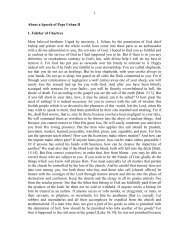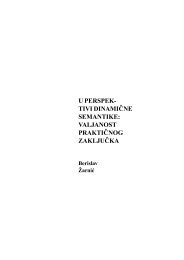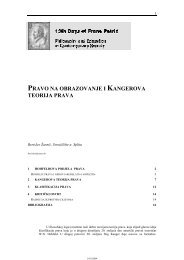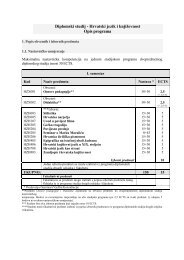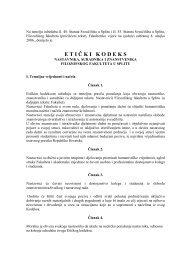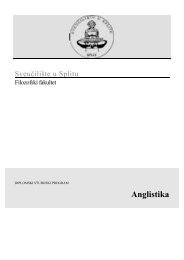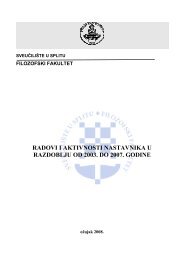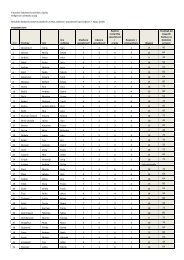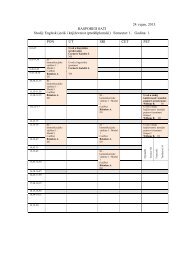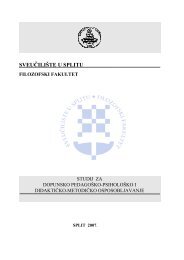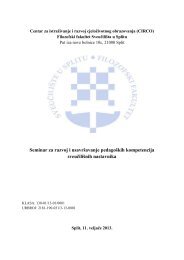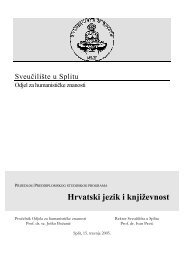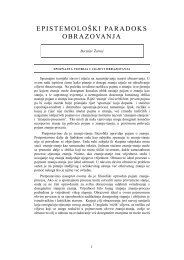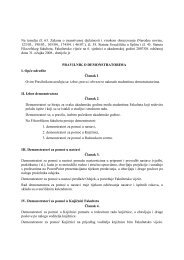English Studies
English Studies
English Studies
Create successful ePaper yourself
Turn your PDF publications into a flip-book with our unique Google optimized e-Paper software.
G R A D U A T E D E G R E E P R O G R A M M E : E N G L I S H S T U D I E S<br />
Recommended<br />
reading<br />
Supplementary<br />
reading<br />
Teaching<br />
methods<br />
Assessment<br />
methods<br />
Language of<br />
instruction<br />
Quality<br />
assurance<br />
methods<br />
Modern and contemporary texts illustrative of poetic and fictive <strong>English</strong><br />
forms will be supplied to students. During the prose segment of the course,<br />
some reference will be made to:<br />
Burroway, J. (1987). Writing Fiction. Boston: Little Brown.<br />
Based on the creative interests of specific students the lecturer will<br />
recommend individually applicable texts.<br />
Seminars on modern and contemporary texts illustrative of poetic and<br />
fictive <strong>English</strong> forms. Practical sessions (Workshops) – student centred<br />
critical discussions of student work / Advisory hours / Independent study (in<br />
the form of creative and critical writing) will be regularly required.<br />
The assessment of student knowledge/performance will be based on the<br />
following:<br />
1. Continuous assessment: independent homework/project tasks (the<br />
production of creative work and the production of critical commentaries<br />
on other’s work), and observation of the quality and frequency of the<br />
student’s participation in critical discussions.<br />
2. Production of a portfolio of work, the semester’s work though<br />
substantially revised to the critical specifications of peer commentary.<br />
Exam: an oral defence of creative decisions taken in the portfolio.<br />
<strong>English</strong>.<br />
1. Student feedback via questionnaires and surveys.<br />
2. Lecturers responsible for the same subject area collaborate closely and<br />
monitor each other’s work.<br />
Course title Lexical semantics<br />
Course code<br />
Type of course<br />
Level of course<br />
HZE710<br />
Seminar / Advisory hours<br />
Elective Course<br />
Specialised level course<br />
Year of study First Semester Two<br />
ECTS<br />
(Number of<br />
credits allocated)<br />
Name of<br />
lecturer<br />
Learning<br />
outcomes and<br />
competences<br />
3 ECTS<br />
Contact hours (20 seminars + 1 advisory hours) = 1 credit.<br />
Student study time (60 hours) = 2 credits.<br />
Prof. dr. Danica Škara<br />
Understanding of the basic theoretical concepts in lexical semantics<br />
Familiarity with modern terminology in lexical semantics<br />
Experience in critical considerations of the topics in lexical semantics and in<br />
presenting them in the written form and orally<br />
Ability to apply theoretical concepts in scientifically suitable ways, to<br />
develop own concepts and draw conclusions about the characteristics of<br />
32



